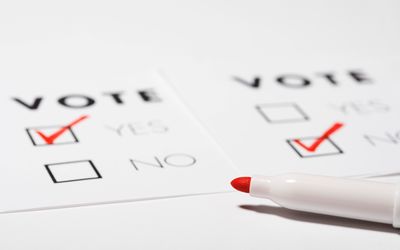SOUTH Africans go to the polls on Wednesday to vote in national elections for the fifth time since the ending of apartheid.
It is an event that had been billed as a potential defining moment in the short history of our democracy, but that now seems unlikely to live up to such a lofty expectation.
This was meant to be the election that would see South Africa maturing as a democracy, where the politics of identity that had become ingrained in South Africans of all races after 300 years of colonial and apartheid rule would be replaced by issues-based voting. The election where the rising proportion of "born-free" South Africans among the electorate would see race and ethnicity becoming less important to voters than ideas and values.
It was undoubtedly naive to expect this "normalisation" of South African politics to happen between one election and the next just because the youngest generation of voters has no personal memory of apartheid. The pernicious effects of apartheid remain, after all, if not unaltered, then certainly still too strong to ignore.
And we should not be too hard on ourselves: five sequential substantially free and fair elections is an achievement not many countries in the world can boast about, let alone in Africa. Our form of democracy may be crude in many respects, especially between elections, and some of the institutions that are meant to support our democracy may be under threat, but the fact remains that if we are governed by deeply flawed political parties and leaders for the coming five years, it will be because we chose them.
But it is still disappointing that, as reported in this newspaper on Monday, media analysis by the market research company Ornico Group shows that less than 30% of pre-election political coverage in print, broadcast and online media has dealt with policy issues.
The rest reflects — in the words of CEO Oresti Patricios — "electioneering, bickering and the exhausting use of rhetoric".
That is food for thought for the media, which tend to pay lip service to the importance of policies but know they attract more readers, viewers and advertisers when the insults, bricks and tear gas cannisters fly. Yet it also reflects events on the ground, specifically the turmoil in the tripartite alliance, the founding of the Economic Freedom Fighters (EFF) and divisions among affiliates of the Congress of South African Trade Unions.
If there has been a preponderance of media coverage of bickering and wild rhetoric, that is at least partly because the fracturing of the African National Congress (ANC) and its alliance partners has resulted in an awful lot of both. Ironically, it is also a function of the Nkandla scandal, which while ostensibly negative for the governing party has diverted attention from competing party policies — which actually exist — and allowed the ANC to keep the focus on identity by turning the Nkandla issue into a defence of President Jacob Zuma rather than its own misgovernance.
The big debates during this election campaign should have been over where South Africa wants to go as a nation (our vision), how we should be trying to get there (pragmatic policies), and the trade-offs that are required for those policies to be implemented successfully (the necessary social contract). But Election 2014 will be remembered more for the heated discussions over whether Mr Zuma is better suited to the highest office or Pollsmoor than whether the ANC has governed well, the difference between its promise of millions of "work opportunities" and the Democratic Alliance’s millions of permanent new jobs, or whether either is actually deliverable.
The ANC’s majority will probably be reduced, the EFF will gain representation in Parliament, and the DA seems likely to cement its position in the Western Cape. But will the message from the electorate to their representatives be clear and loud enough to prompt the kind of step change in South Africa’s governance — especially as regards economic, industrial and labour policy — that is required for us to increase employment and reduce inequality?
Probably not. That implies more of the same for South Africa over the coming five years — policy confusion, labour instability and investor uncertainty, leading to stagnant economic growth, continuing corruption and further social unrest. The ANC may eventually recognise that Mr Zuma has become a liability to it and the country and elbow him out before the end of his second term, but that is likely to be too late to avoid the consequences of having allowed one man to hold the country to ransom and distract it from confronting the future.

Picture: THINKSTOCK
SOUTH Africans go to the polls on Wednesday to vote in national elections for the fifth time since the ending of apartheid.
It is an event that had been billed as a potential defining moment in the short history of our democracy, but that now seems unlikely to live up to such a lofty expectation.
This was meant to be the election that would see South Africa maturing as a democracy, where the politics of identity that had become ingrained in South Africans of all races after 300 years of colonial and apartheid rule would be replaced by issues-based voting. The election where the rising proportion of "born-free" South Africans among the electorate would see race and ethnicity becoming less important to voters than ideas and values.
It was undoubtedly naive to expect this "normalisation" of South African politics to happen between one election and the next just because the youngest generation of voters has no personal memory of apartheid. The pernicious effects of apartheid remain, after all, if not unaltered, then certainly still too strong to ignore.
And we should not be too hard on ourselves: five sequential substantially free and fair elections is an achievement not many countries in the world can boast about, let alone in Africa. Our form of democracy may be crude in many respects, especially between elections, and some of the institutions that are meant to support our democracy may be under threat, but the fact remains that if we are governed by deeply flawed political parties and leaders for the coming five years, it will be because we chose them.
But it is still disappointing that, as reported in this newspaper on Monday, media analysis by the market research company Ornico Group shows that less than 30% of pre-election political coverage in print, broadcast and online media has dealt with policy issues.
The rest reflects — in the words of CEO Oresti Patricios — "electioneering, bickering and the exhausting use of rhetoric".
That is food for thought for the media, which tend to pay lip service to the importance of policies but know they attract more readers, viewers and advertisers when the insults, bricks and tear gas cannisters fly. Yet it also reflects events on the ground, specifically the turmoil in the tripartite alliance, the founding of the Economic Freedom Fighters (EFF) and divisions among affiliates of the Congress of South African Trade Unions.
If there has been a preponderance of media coverage of bickering and wild rhetoric, that is at least partly because the fracturing of the African National Congress (ANC) and its alliance partners has resulted in an awful lot of both. Ironically, it is also a function of the Nkandla scandal, which while ostensibly negative for the governing party has diverted attention from competing party policies — which actually exist — and allowed the ANC to keep the focus on identity by turning the Nkandla issue into a defence of President Jacob Zuma rather than its own misgovernance.
The big debates during this election campaign should have been over where South Africa wants to go as a nation (our vision), how we should be trying to get there (pragmatic policies), and the trade-offs that are required for those policies to be implemented successfully (the necessary social contract). But Election 2014 will be remembered more for the heated discussions over whether Mr Zuma is better suited to the highest office or Pollsmoor than whether the ANC has governed well, the difference between its promise of millions of "work opportunities" and the Democratic Alliance’s millions of permanent new jobs, or whether either is actually deliverable.
The ANC’s majority will probably be reduced, the EFF will gain representation in Parliament, and the DA seems likely to cement its position in the Western Cape. But will the message from the electorate to their representatives be clear and loud enough to prompt the kind of step change in South Africa’s governance — especially as regards economic, industrial and labour policy — that is required for us to increase employment and reduce inequality?
Probably not. That implies more of the same for South Africa over the coming five years — policy confusion, labour instability and investor uncertainty, leading to stagnant economic growth, continuing corruption and further social unrest. The ANC may eventually recognise that Mr Zuma has become a liability to it and the country and elbow him out before the end of his second term, but that is likely to be too late to avoid the consequences of having allowed one man to hold the country to ransom and distract it from confronting the future.














 News, views and analysis of South Africa's national and provincial elections on May 7 2014
News, views and analysis of South Africa's national and provincial elections on May 7 2014






Change: -0.47%
Change: -0.57%
Change: -1.76%
Change: -0.34%
Change: 0.02%
Data supplied by Profile Data
Change: -1.49%
Change: -0.05%
Change: -0.47%
Change: 0.00%
Change: -0.22%
Data supplied by Profile Data
Change: 1.08%
Change: 1.40%
Change: 1.01%
Change: 0.59%
Change: 1.05%
Data supplied by Profile Data
Change: 0.11%
Change: -1.15%
Change: -0.07%
Change: -0.86%
Change: -0.39%
Data supplied by Profile Data